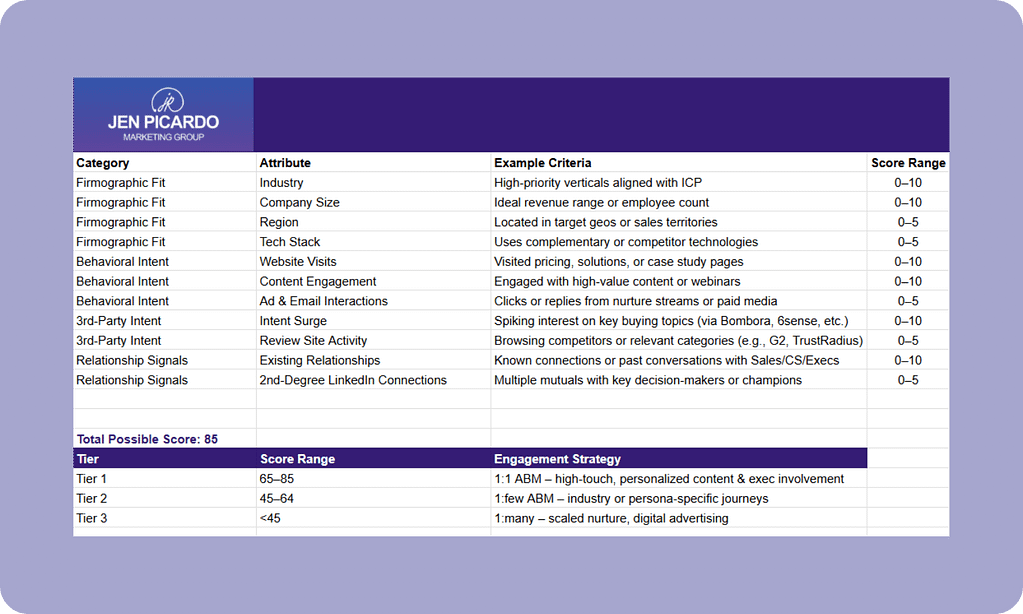From Guesswork to Growth: Why Account Scoring Is the Backbone of ABM Success
In the world of Account-Based Marketing (ABM), not all accounts are created equal — and treating them like they are is a fast track to wasted time, budget, and team energy.
The truth is, success in ABM doesn’t come from casting a wide net. It comes from precision. From knowing which accounts are worth your time, when they’re ready for engagement, and how to meet them with exactly the right message at the right moment.
That’s where account scoring steps in — not as a “nice to have,” but as mission-critical infrastructure for real revenue growth.
Why Prioritization Isn’t Optional
Every ABM team dreams of bigger deals, faster close rates, and long-term customer value. But you can’t achieve any of that if your target list is based on surface-level details or, worse, gut instinct.
Without a solid scoring model in place, you risk misallocating your highest-value resources — your people, your marketing dollars, and your time — on accounts that simply aren’t ready or aren’t the right fit.
Prioritization isn’t about doing less work. It’s about doing the right work, for the right accounts, at the right time.
Building a Tiered Account Scoring Model That Works
A winning account scoring model starts by blending two crucial factors: fit and intent.
Here’s what that means:
- Firmographic Fit: Company size, industry, location, revenue, and tech stack. Does the account match your ideal customer profile?
- Behavioral Signals: Web activity, content downloads, ad engagement — any indicator that shows active interest.
- Intent Data: Search behavior, third-party data, and signals that suggest buying intent before a prospect ever fills out a form.
- Relationship Signals: Existing connections within the account, past engagements, or sales conversations that give you a relational foothold.
Pro Tip: Accounts with high relationship scores can often be accelerated with personal, high-touch tactics
These methods break through noise and build trust fast — especially in top-tier accounts.
- Warm intros through mutual connections
- Executive-to-executive outreach
- Personalized video or voice notes referencing shared contacts
This layered approach helps you sort your accounts into meaningful tiers. Tier 1? These are your high-fit, high-intent accounts, worthy of one-to-one personalization. Tier 3? Lower-intent or earlier-stage accounts, ideal for programmatic engagement and nurture.
Pro Tip: Consider adding custom signals based on your GTM motion or product type.
These nuanced signals can reveal opportunities traditional models might miss. For example:
- Referral source (e.g., partner-introduced accounts)
- Customer lifecycle stage (e.g., re-engaging churned customers or upselling existing ones)
Before you put your scoring model into action, it helps to see what this looks like in practice.

Download our Account Scoring Template + Example. This includes customizable fields for fit, intent, and relationship signals, with sample weighting to help you prioritize like a pro. Whether you’re starting from scratch or refining an existing model, this framework gives your ABM team a strong, strategic foundation.
From Score to Strategy: Putting Data to Work
Scoring without action is just another report gathering dust.
Once your scoring model is live, the real magic happens: segmentation and routing.
- Tier 1 Accounts: Roll out personalized, one-to-one strategies — custom content, direct outreach, and tailored solutions.
- Tier 2 Accounts: Employ a one-to-few approach, grouping accounts by shared characteristics and delivering semi-personalized campaigns.
- Tier 3 Accounts: Lean on broader programmatic plays like display ads, content syndication, or lightly tailored email nurture tracks.
By understanding an account’s fit and readiness, you can tailor your outreach to match their buying journey — creating momentum instead of friction.
Messaging Meets Momentum
At the end of the day, account scoring isn’t about numbers — it’s about relevance.
It’s about speaking the right language, solving the right problems, and showing up when and where it matters most. When you prioritize effectively, you’re not just marketing. You’re building trust, shortening sales cycles, and turning potential into pipeline — faster and smarter.
It’s time to move past guesswork. With a smart, scalable scoring model, you’re not chasing growth — you’re driving it. Reach out, I’d love to help.

0 Comments